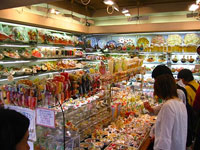Russian government to level down food prices
An unexpected food prices breakthrough in Russia on the eve of elections has the government making up tricks, including a few from the USSR days, to avert general discontent.

Prices for dairy products shot up 9.4 percent in September and cooking oil a staggering 13 percent. In some regions, bread prices have jumped 50 percent or even doubled in recent months.
While food prices are rising across the globe, in a country where poverty is still widespread and food costs consume the bulk of many household incomes, the soaring prices are a particular cause for worry.
In a throwback to the Soviet era, when the economy was planned and prices set with no regard for supply and demand, some regions have started to set price controls on staples.
Middlemen have been singled out with a ferocity that plays on deep-seated suspicions about "spekulanty" the speculators who bought and sold scarce goods during Soviet times and got rich in the process.
The federal antitrust agency has started cracking down on food cartels, and the country's neglected farmers have found a patron in Russia's new prime minister, who spent 18 years managing Soviet collective farms.
Thanks largely to a poor harvest in many exporting countries and rising demand for biofuels, prices for food are up sharply around the world. The increase is amplified in Russia because of a weak market system that allows cartels to form and middlemen to set exorbitant prices.
President Vladimir Putin addressed the rising food prices Thursday in his three-hour televised question-and-answer session with Russians across the vast country. The question came from a farmer in a southern village who complained that the liter (quart) of milk he sells for 8 rubles (US 30 cents) costs 30 rubles (US$1.25) once it hits the shelf in local stores.
Putin blamed the severe markups on middlemen who have a lock on supplies in many regions and the corrupt officials who share the profits.
"In a large part this is happening and it's not pleasant for me to talk about this _ because regional leaders cooperate with these monopolies and even consider them their own," he said.
Pensioners are the most vulnerable to the price rises.
"It's terrible my entire pension is spent on food, and it still isn't enough," says Nina Isayeva, who stands outside a Moscow subway station every evening for three hours selling cigarettes to earn a bit of extra money. She says her monthly pension is 3,000 rubles (US$120, Ђ84).
The parliament recently voted to raise pensions some 370 rubles (US$15, Ђ10.5) beginning Dec. 1, and more next year, but with food prices creeping higher by the week, pensioners like Isayeva will still be playing catchup.
The steady pension increases will inject billions of dollars of cash into the economy and fuel inflation, predicted to hit 10 percent this year.
Food is an ultra-sensitive issue in Russia, where past shortages have led to rationing, famine and even the 1917 Bolshevik Revolution. There is no dearth of food now in Russia, where grocery chains are expanding aggressively, but fears that what costs 20 rubles now might soon cost 30 have sparked some panic-buying and hoarding.
The approaching parliamentary election on Dec. 2 and presidential vote three months later have added urgency to the government's efforts to bring food prices under control and prevent a backlash at the polls.
The new prime minister, Viktor Zubkov, seems to regard the country's food production as a matter of personal pride.
Shortly after his appointment last month, he toured a farm in Penza, 500 kilometers (300 miles) east of Moscow and instructed his agriculture minister to do everything possible so that Russia could rely on its own food output.
But with prices climbing fast, the prime minister is now backtracking. On Wednesday, for instance, the government reduced import duties on milk and dairy products from 15 percent to 5 percent for six months to put more milk on store shelves.
But most of the government's stop-gap measures hark back to the best traditions of the Soviet era and run counter to the spirit of the market economy that Russia has embraced.
Some regional governors have begun an arm-twisting campaign to get producers to put a lid on further price hikes. The small Siberian region of Buryatia froze prices on some staples, while the governor of the Samara region in central Russia coerced food producers to suspend price increases on essential foodstuffs for three months.
Alexander Konovalov, the head of the Moscow-based Institute of Strategic Assessment, said Russia's governors have sufficient levers at their disposal to prevent food prices from spiraling out of control.
Sergei Mironov, the speaker of parliament's upper house, jumped on the populist bandwagon by saying the state should become the main seller of food in Russia and proposed establishing a state food monopoly.
Lawmakers in the lower house said they were drafting legislation that would crack down on middlemen who take an unfair share of the profits as goods travel the long trail from farm to store shelves.
"It's the middlemen raising prices, not us," said Svetlana Kulikova, manager of a grocery store in western Moscow, saying that her store, part of a chain, maintains its 15 percent markup on distributor prices.
Igor Artemyev, head of the Federal Anti-Monopoly Service, has said that one-fourth of the country's food inflation is the result of cartel arrangements. For instance, six dairies account for more than 60 percent of Russia's total milk production, an astounding situation in a country stretching across 11 time zones, the antitrust agency said.
The agency has opened investigations into three sectors of the market _ bread, milk and cooking oil _ and in recent days has uncovered 15 antitrust violations in the food industry.
Subscribe to Pravda.Ru Telegram channel, Facebook, RSS!


